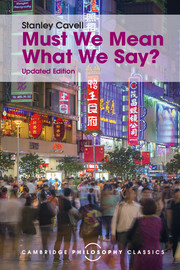Book contents
- Frontmatter
- Dedication
- Contents
- Permissions
- Acknowledgements
- Preface to this edition
- Preface to updated edition of Must We Mean What We Say?
- Foreword: An audience for philosophy
- 1 Must we mean what we say?
- 2 The availability of Wittgenstein's later philosophy
- 3 Aesthetic problems of modern philosophy
- 4 Austin at criticism
- 5 Ending the waiting game: A reading of Beckett's Endgame
- 6 Kierkegaard's On Authority and Revelation
- 7 Music discomposed
- 8 A matter of meaning it
- 9 Knowing and acknowledging
- 10 The avoidance of love: A reading of King Lear
- Thematic index
- Index of names
4 - Austin at criticism
Published online by Cambridge University Press: 05 November 2015
- Frontmatter
- Dedication
- Contents
- Permissions
- Acknowledgements
- Preface to this edition
- Preface to updated edition of Must We Mean What We Say?
- Foreword: An audience for philosophy
- 1 Must we mean what we say?
- 2 The availability of Wittgenstein's later philosophy
- 3 Aesthetic problems of modern philosophy
- 4 Austin at criticism
- 5 Ending the waiting game: A reading of Beckett's Endgame
- 6 Kierkegaard's On Authority and Revelation
- 7 Music discomposed
- 8 A matter of meaning it
- 9 Knowing and acknowledging
- 10 The avoidance of love: A reading of King Lear
- Thematic index
- Index of names
Summary
Except for the notable translation of Frege's Foundations of Arithmetic and whatever reviews there are, Philosophical Papers collects all the work Austin published during his lifetime. In addition, this modest volume includes two papers which will have been heard about, but not heard, outside Oxford and Cambridge. The first is one of the two pieces written before the war (“Meaning,” 1940) and shows more clearly than the one published a year earlier (“Are There A Priori Concepts?,” 1939) that the characteristic philosophical turns for which Austin became famous were deep in preparation. The second previously unpublished paper (“Unfair to Facts,” 1954) is Austin's rejoinder to P. F. Strawson's part in their symposium on truth, a debate which, I believe, Austin is widely thought to have lost initially, and to lose finally with this rejoinder. Austin clearly did not concur in this opinion, repeating the brunt of his countercharge at the end of the course of lectures he gave at Berkeley in 1958–1959. The remaining five papers have all become part of the canon of the philosophy produced in English during the past generation, yielding the purest version of what is called “Oxford philosophy” or “ordinary language philosophy.” I will assume that anyone sharing anything like his direction from the English tradition of philosophy, and forced into his impatience with philosophy as it stands (or patience with the subject as it could become), will have found Austin's accomplishment and example inescapable.
As with any inheritance, it is often ambiguous and obscure in its effects. Two of these provide the subjects of my remarks here: the first concerns Austin's methods or purposes in philosophy; the second, related effect concerns the attitudes toward traditional philosophy which he inspires and sanctions.
I
I wish not so much to try to characterize Austin's procedures as to warn against too hasty or simple a description of them: their characterization is itself, or ought to be, as outstanding a philosophical problem as any to be ventured from within those procedures.
- Type
- Chapter
- Information
- Must We Mean What We Say?A Book of Essays, pp. 91 - 106Publisher: Cambridge University PressPrint publication year: 2015

